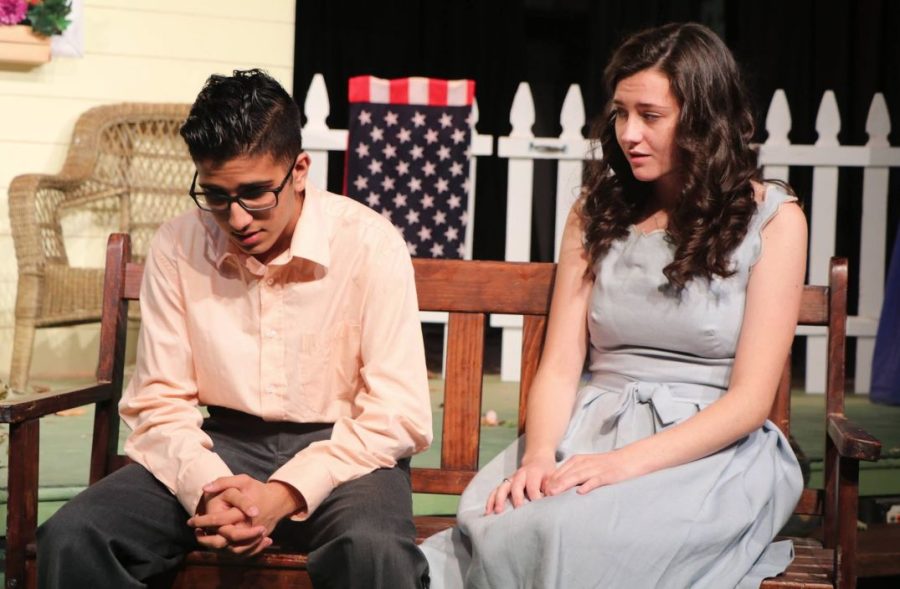VST’S “All My Sons” Brings Shocking Postwar Drama to Audiences
November 27, 2018
On Tuesday, Nov. 13, Villanova Student Theater premiered its first performance of Arthur Miller’s “All My Sons.” Directed by Noelle Gambale, the student cast performed the famous play six times. The production originally opened on Broadway in 1947 and turned Miller’s career around. It would go on to win multiple Tony Awards and inspire the name of the popular band “Twenty One Pilots.” VST’s rendition of the show provided a poignant and important glimpse into the past for all viewers.
The story of All My Sons unfolds over the course of three acts. It is set in the 1940s in a suburban American neighborhood where Joe Keller, a successful businessman, lives comfortably with his wife, Kate and son, Chris. The sole sadness in their lives is the loss of their other son, Larry, who went missing in World War II. Multiple years have passed since the war, and while Chris and Joe have both resigned themselves to the reality of Larry’s death, Kate has held on to hope that her son will return.
The story centers around the visit of Larry’s former love, Ann. Chris and Ann have fallen in love, but their relationship is complicated by Kate’s denial of Larry’s passing. The audience later finds out that there is further tension between the pair: Ann’s father, Steve Deever, is in prison for selling cracked cylinder heads to the Air Force, causing the deaths of 21 pilots in plane crashes. Joe was his partner but has been exonerated of the crime, though many in the neighborhood still suspect that he is guilty.
This tension is quickly and suddenly heightened by the arrival of Ann’s brother, George, following a visit to his father in prison. George brings accusations of Joe’s guilt, demanding that Ann leave immediately and never marry the son of the man who destroyed the Deever family. Upon a slip in Kate’s words, it is revealed that these accusations are true. George leaves furiously and Chris is plunged into inner turmoil, unable to accept this new information about his father. Ann then confronts Kate, telling her that she will marry Chris, regardless of Kate’s opinion.
Upon Kate’s denial, Ann reveals a letter to Kate that she received soon after his disappearance that unveils a terrible truth: Larry killed himself during a mission in the war after he discovered what his father had done. When Chris, too, discovers this letter, he resolves to turn his father in. Joe sorrowfully agrees and goes inside to grab his coat. The characters and audience alike are left stunned when a gunshot is heard from within the house, implying Joe’s suicide. The play closes in darkness, as Kate tells her son not to blame himself and to live on.
Villanova Student Theater’s production of the play was excellent. The directing highlighted the vibrant emotions of each character, which struck audience members to the core. Each actor was utilized well and aptly fit the characters to which they were cast. In a play with a time period and an intensity of emotions that are foreign to many, the actors were soulful and believable. Well-done voice intonation was key to expressing the characters’ multifaceted emotions and motives. This was especially true for Kate, Joe and Chris, all who display immense changes, hidden secrets, and multiple sides throughout the play.
Still, viewers could easily sympathize with the characters and were equally conflicted by the dilemmas that the plot presented. The play was well paced: some moments of the production that slowly built suspense were matched by periods of rapid events that disquieted the audience. Overall, the directing and acting utilized Miller’s script to effectively develop a gripping performance.
The production’s design elements also rose to the challenge the play presented. Costume design was accurate to the time period, and clear effort was shown in the layered and changing outfits of each character. Such outfits fit each character’s nature as well: Joe’s workwear helped to illustrate his business-oriented, robust nature. Meanwhile, Chris’s neatly buttoned shirt and dress pants emphasized a more reserved, yet slightly more serious nature than his father. Ann’s flower-adorned dress asserted her innocence and the youthful beauty that other characters mentioned. The set was simple and constant: the facade of a house and a backyard with a fence through which many characters traverse as the plot unfolds. This simplicity was effective in highlighting the idea that dark things can occur even in the quaintest of places. The set’s constancy was used to indicate the emotions of each character. Doors, chairs and fences were unchanging in their position and form, but a great importance was placed upon how characters would interact with these objects: a violent slam from one character would provide contrast to a quiet retreat from another. Clear thoughtfulness behind the production’s design provided a fitting atmosphere for each show.
The audience was thoroughly thrilled by the surprises and intensity of “All My Sons.” Villanova Student Theater’s cast and crew put on a well-constructed presentation of Miller’s play, and viewers were not disappointed.











